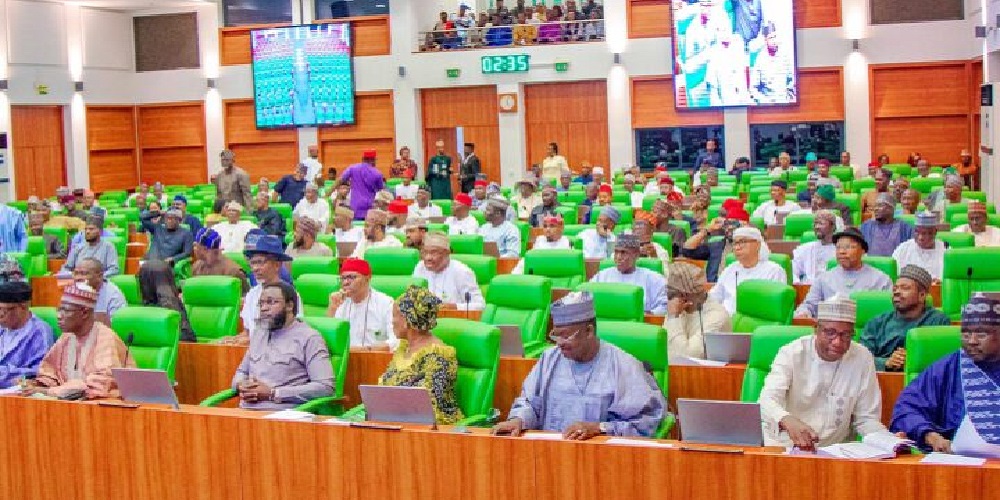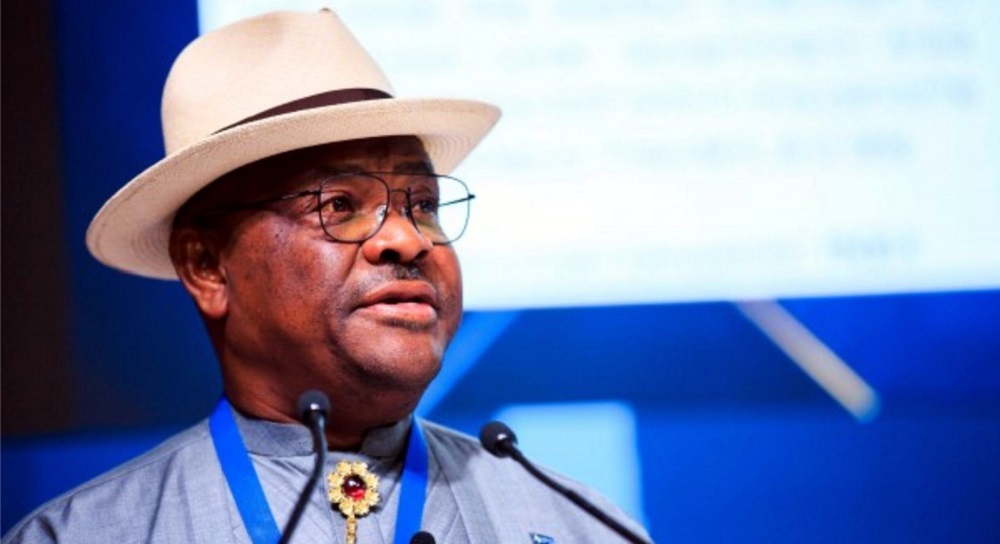News
Cybercrime Act: Reps Direct NSA, CBN To Carryout Further Enlightenment on Levy

By Gloria Ikibah
The House of Representatives has moved a motion directing the Central Bank of Nigeria and Office of National Security Adviser to cause further enlightenment on the Cyber Crimes Act and implementation of the 0.5% (0.005) levy, correct the wrong perception on the implementation of the Cybercrimes Act been circulated in the social media.
This was sequel to a motion of urgent public importance by the House Minority Leader, Rep. Kingsley Chinda and seven (7) other lawmakers on the “Urgent Need To Correct The Wrong Perception Of The House Of Representatives Position On Implementation Of The Cybercrimes Act”, on Tuesday at plenary.
Debating the motion Rep. Chinda noted that on 9th May 2024, the House considered a joint motion on the implementation of the Cybercrimes (Prohibition and Prevention) Act, 2015 as amended in 2024 and resolved to direct the Central Bank of Nigeria (CBN) to withdraw the ambiguous circular of 6th May 2024 and in its place issue an unambiguous and unequivocal circular in line with the letters and spirit of the law and directed the House Committees on Banking Regulations and Ancillary Institutions to guide the CBN properly.
But the Minority Leader stated that the media space was awash with the wrong impression that the House of Representatives was against a Law passed by Her, which impression painted the House in bad light.
He said: “Cognizant that the world is a global village and with the internet-of-things, crime is moving from meat space (real or physical world) to cyber space without the physical limitations of boundaries.
“Further cognizant that cybercrime is more devastating and can cripple a nation easier that the conventional crime in the physical space.
“Aware the humongous cost expanded on security and the very likely limitations of funding cyber space security by government.
“Further aware that some establishments carry out their businesses within the cyber space and make profits therefrom.
“Also aware that the Cybercrimes Act imposes a levy of 0.05% (0.005) on some establishments enumerated in the second schedule to the Act, that occupy the cyberspace; do business therein and make profit therefrom”.
Rep. Chinda stated that the letter and spirit of the Law as crafted by the Parliament is not only commendable but in tune with contemporary trend and supportive of the global fight against Cyber Crime.
He further noted that the levy does not apply to ordinary Nigerians but only to the establishments listed in the second schedule to the Act, which includes; GSM Service providers and all telecommunication companies; Internet Service Providers; Banks and other Financial Institutions; Insurance Companies; and Nigerian Stock Exchange.
“Order 20, Rule 93 (2) (b) of the House Rules provides that ‘in the event of joint oversight on issues relating to cybersecurity, the Committee on National Security and Intelligence shall work with the Committee on Digital and Information Technology. In such cases, the Committee on National Security and Intelligence shall be the lead Committee”, he added.
Explaining further he said: “Our role is to make Law and once there is an attempt to abuse the law that we made, it is necessary that we take a clear decision and that is what I have called on us to do today. Now, if in cause of implementation, we find out that the implementers, that is, the executive arm, are abusing it, we come back to amend it. But we can not at this stage amend by way of motion.
All we are doing is to caution the executive arm. This side, the content of the law we made, in cause of execution, does not task Nigerians directly or indirectly. If we find out that there are indirect taxes, it is justified for us to come back here and amend the law and see how we can improve on what we have done. Therefore, all we are doing today is to continue to enlighten Nigerians because a lot of them are still not aware that this law does not apply to you, but those who are making profit from the cyber space”.
“If the people feel otherwise, it is our duty to came back and amend that portion if possible remove it”.
In his ruling the presiding officer who is the Deputy Speaker, Benjamin Kalu stated: “Bybthis it means that the House of Representatives is standing bybthe law it made on the Cyber Security. We are standing in the government that is interested in ensuring that we are protected on what we can see with our physical eyes and what happens within the Cyber Space.
“That have shown the support that citizens of the country should not be taxed”.
The House through a voice vote unanimously adopted the motion and mandated the House Committees on National Security and Intelligence, Digital and Information Technology, Justice, Digital Economy, and Electronic Banking to superintend over the implementation of the House resolution of 9th May 2024 on the Cybersecurity Levy, with the committee on National Security and Intelligence as the lead the committee.
News
Po!n, betting sites recorded 162m Nigerian visitors in June – Report

A report by global data and business intelligence platform, StatiSense, has revealed that more than 162 million Nigerians visited porn and betting websites in June 2024.
According to the platform’s most recent data, which lists the top ten websites that Nigerians saw on their mobile devices in June, a sizable percentage of this traffic visited websites with gambling and pornographic content.
A post on StatiSense’s official X page revealed that a variety of search engines, social media apps, and betting platforms were among the most popular websites.
Notably, two pornographic websites, Xvideos and Xnxx, came in second and sixth place respectively with a total of 80.18 million visits.
In addition, Nigerian mobile users visited sporting websites 176.83 million times. Of these, 83.1 million visits were allocated to sports betting sites Sportybet and Bet9ja, which secured third and fourth places on the list.
Google and Facebook were also among the sites that featured prominently in the report.
News
Reps hail Wike, Tamuno over AICL’s improved revenue, infrastructure

Members of the House of Representatives’ Committee on FCT, led by Hon. Aliyu Muktar Betara have applauded the Minister of Federal Capital Territory (FCT), Nyesom Wike over ongoing infrastructural development projects across the nation’s capital city.
The lawmakers who spoke during an interactive session with the Group Managing Director of Abuja Investment Company Limited (AICL), Dr. Maureen Tamuno applauded her ingenuity towards improved revenue generation since her assumption of office.
While presenting her scorecard and strategy adopted in the turnaround of Abuja Investment Company Limited to the Committee, Dr. Tamuno disclosed that AICL only manages the district markets, not the entire markets across the territory.
According to her, Wuse Markets is owned 90 percent by the individuals who bought the shops while AICL owns 10 percent.
“For example, Wuse Market is owned 90 percent by the owners, we own 10 percent. What Abuja Management does for Wuse market is to manage the facility there through the toll taking which they do collect on our behalf and then they manage the facilities, they manage the refuse collections and they also work with the market association.”
News
Tinubu serious in solving economic crisis — Wike

Minister of Federal Capital Territory (FCT), Nyesom Wike on Friday said President Bola Ahmed Tinubu is serious in solving the economic crisis in the country.
Wike gave the assurance during the inspection of the ongoing construction of the 7.3 kilometers Gaba/Tokulo road in Bwari Area Council.
He pleaded with Abuja residents to give the present administration the needed support to deliver the dividends of democracy.
Addressing reporters during the inspection visit, the FCT Minister expressed satisfaction with the speed and quality of work on the road project and assured that it will be adequately funded to ensure its timely completion by December this year.
The Minister who revealed that the project was 40 percent complete, said about 70 percent of the contractual sum has been paid to the contractor by the FCT Administration and expressed confidence in the capacity of the contractor to deliver the project within the agreed schedule.
Wike further disclosed that the Gaba/Tokulo road, when completed, will not only enhance transportation in the rural parts of the FCT, but will also improve food security in the nation’s capital by providing access to the farmlands, as well as access to the markets.
He also stressed the commitment of the FCT Administration to providing infrastructure in the FCT Area Councils, in line with the Renewed Hope Agenda of President Bola Ahmed Tinubu.
Wike said: “So many people have thought that we are only concentrating in the city. Yesterday, we were in Saburi, today we are in Bwari. Tomorrow, we will be in Kuje, so that people will understand that while we are doing in the city, we are also carrying out development in the satellite towns and the rural areas because by the Renewed Hope Agenda, development is not only to be concentrated within the city but also to take to the rural areas in order to improve the economy.
“Here is an agrarian area; without this road, how are they going to move their goods? And this is part of the problems we have in terms of food insecurity. People are talking about shortages of food, but if we don’t have means of transportation, that is also a problem.
“We are trying to solve that problem of transportation for farmers to be able to go and bring whatever they have produced for people to consume or to buy”.
Wike, while thanking the people of Bwari for their support for the government, also reiterated that President Tinubu was committed to addressing the economic problems of the country and called for their continued support.
He said: “We thank the people of Bwari and we want to also let them know that the government of President Tinubu is serious about solving the economic crisis we have. All we urge Nigerians is just to be patient.
-

 News23 hours ago
News23 hours agoNationwide protest: ‘Airport Is Filled Up, Govs, Senators, Reps, Ministers Traveling Abroad’ — Fayose
-

 News16 hours ago
News16 hours agoLP blows hot gives Akpabio 72hrs to declare Senator Onyewuchi’s seat cacant for dumping party for APC
-

 Politics15 hours ago
Politics15 hours agoBreaking! LP crisis takes fresh twist as ‘new’ chairman emergesl
-

 Opinion3 hours ago
Opinion3 hours agoFuel Challenge In Nigeria: Modular refineries to the rescue?
-

 News15 hours ago
News15 hours agoJust in: DSS moves against organisers of protest, freezes bank accounts as group set to file legal action against UBA
-

 News16 hours ago
News16 hours agoSEE Dollar to naira exchange rate today at black market
-

 News3 hours ago
News3 hours agoAraraume mourns Iwuanyanwu, says Nigeria has lost a genuine patriot
-

 News11 hours ago
News11 hours agoFinally, IGP approves hunger protests across Nigeria








